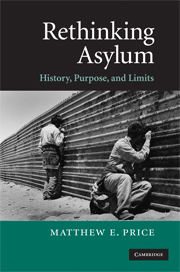Book contents
- Frontmatter
- Contents
- Acknowledgments
- Introduction
- Chapter 1 Recovering Asylum's Political Roots
- Chapter 2 Promoting Political Values through Asylum
- Chapter 3 What is “Persecution”?
- Chapter 4 Persecution by Private Parties
- Chapter 5 Asylum, Temporary Protection, and the Refugee Policy Toolkit
- Chapter 6 Restrictions on Access to Asylum
- Conclusion
- Bibliography
- Index
Conclusion
Published online by Cambridge University Press: 26 January 2010
- Frontmatter
- Contents
- Acknowledgments
- Introduction
- Chapter 1 Recovering Asylum's Political Roots
- Chapter 2 Promoting Political Values through Asylum
- Chapter 3 What is “Persecution”?
- Chapter 4 Persecution by Private Parties
- Chapter 5 Asylum, Temporary Protection, and the Refugee Policy Toolkit
- Chapter 6 Restrictions on Access to Asylum
- Conclusion
- Bibliography
- Index
Summary
For billions of people, existence is precarious. The World Bank estimates that 985 million people live on less than one dollar a day and 2.6 billion live on less than two dollars a day. Scores of millions more live amidst civil war or in failed states unable to ensure their physical security from criminal gangs, ethnic militias, or religious extremists. Each year, multitudes of such people traverse vast deserts and dangerous seas in search of a better life in the West. They arrive to the realization that they are unwanted and that their mere presence makes them criminals. By and large, the West's migration policy is indifferent to the reality of a brutal, dangerous, and grossly unequal world. Asylum, the main safety valve in a system of closed borders, is available to persecuted people; but most of the huddled masses who seek a new life in the West are not persecuted. Any humane sensibility must recognize the appeal of a more inclusive approach to asylum. In the face of extreme need, it seems perverse to single out one particular group – persecuted people – for special treatment.
In the last fifteen years, refugee advocates have succeeded in winning important court victories that have widened the scope of asylum. Courts have stretched their interpretation of the term “persecution” in order to encompass domestic violence, civil conflict, female genital mutilation, and other harm inflicted by non-state actors.
- Type
- Chapter
- Information
- Rethinking AsylumHistory, Purpose, and Limits, pp. 245 - 252Publisher: Cambridge University PressPrint publication year: 2009



